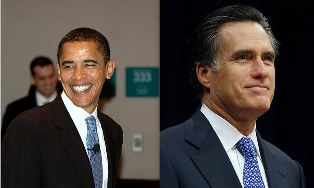 (CNN) -- In the wake of last week's Supreme Court decision upholding the individual mandate in President Barack Obama's health care law, the debate on the campaign trail turned not to extending health care to nearly 50 million uninsured Americans, but to the language of the ruling.
(CNN) -- In the wake of last week's Supreme Court decision upholding the individual mandate in President Barack Obama's health care law, the debate on the campaign trail turned not to extending health care to nearly 50 million uninsured Americans, but to the language of the ruling.
Mitt Romney's campaign, in a politically vulnerable spot given the similar mandate he enacted as governor of Massachusetts, labeled the fine a "penalty" on Monday.
The next day, the chairman of the Republican National Committee made an attempt at party unity, saying on CNN: "Our position is the same as Mitt Romney's position. It's a tax."
Romney himself weighed in on Wednesday, saying he believed the fine assessed to people who choose not to obtain health insurance amounted to a "tax." He reiterated his vow, made at every campaign stop, to repeal the law.
Democrats, intent on not appearing to raise taxes, have stuck with their description of the law as a "penalty," despite the Court's ruling that it's only constitutional as a tax.
Asked Thursday whether Obama "disagrees with the Supreme Court decision that says it's now a tax," campaign press secretary Ben LaBolt said "that's right."
"He's said it was a penalty," LaBolt continued. "You saw our arguments before the court."
And Jay Carney, White House press secretary, said again Thursday "this is clearly a penalty."
Obama's solicitor general, however, did argue in March that the individual mandate could be viewed as constitutional under Congress' taxation power. Donald Verrilli said the fee would be collected by the Internal Revenue Service on April 15, the day Americans pay their federal income taxes.
Asked by associate justice Samuel Alito "can the mandate be viewed as a tax," Verrilli responded "I think it could."
The distinction between "tax" and "penalty" has left some voters frustrated - after all, the mandate remains exactly the same, no matter the label. Conservatives have adopted the phrase "penaltax" and "taxalty," an indication of how meaningless the distinction seems outside presidential politics.
"It is a tax on not buying health insurance! Still sounds like a penalty to me! It's a taxalty!" wrote one conservative blog.
Another right-leaning blog took Chief Justice John Roberts to task for seemingly re-wording the law for political ends: "Roberts effectively re-wrote the law, saying that since Congress failed to call it a tax, he would call it a tax for them. Thus, John Roberts created the penaltax."
Democrats, meanwhile, point to Republicans' parsing of "tax" versus "penalty" as a dodge of the more important point: Does Romney believe Americans should be assessed a fine if they don't obtain insurance?
Romney was asked that question in an interview on CBS Wednesday.
"You know, I made it very clear throughout my campaign and actually while I was governor of Massachusetts that the issue of the uninsured should be dealt with at the state level," Romney said when asked if Americans should be assessed a fee if they don't buy health insurance.
Democrats also point out that Romney, for his pledge of repealing Obamacare, has offered no specifics on how he'd provide health insurance to the 49.9 million uninsured Americans.
The presumptive GOP nominee has promised to replace the law with "real reform," though has offered little by way of firm solutions to a problem that is estimated to cost American taxpayers billions of dollars per year.
On his website, Romney advocates "returning states to their proper place in charge of regulating local insurance markets and caring for the poor, uninsured, and chronically ill," and writes he would "Ensure flexibility to help the uninsured, including public-private partnerships, exchanges, and subsidies."
Beyond that, however, the Republican candidate gives little indication of how, if elected president, he would help states lower their ranks of uninsured citizens.
Romney does indicate he'd keep the Obamacare's more popular provisions, including prohibiting insurance companies from denying coverage based on pre-existing conditions, and allowing young people to remain on their parents' coverage until age 26.
- Home
- News
- Opinion
- Entertainment
- Classified
- About Us
 MLK Breakfast
MLK Breakfast- Community
- Foundation
- Obituaries
- Donate
11-26-2024 11:50 am • PDX and SEA Weather












































































































































































































































































































